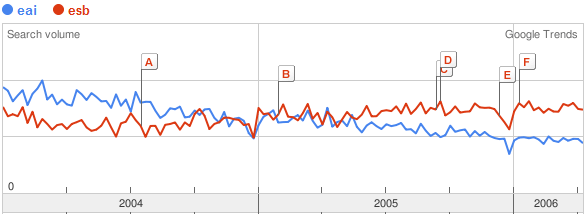Clickstream
Investigating the New Google Trends Tool
Google Trends is an interesting new item that lets you query Google's search volume and news terms, showing the results over time, by region / city and shows stories linked to the terms. You're seeing interest as measured by people searching, which isn't necessarily the best way to look at interest but it's good for some topics. One neat aspect is the ability to compare up to five different search terms at the same time. I used it to do some initial analysis. Here's what I learned.
The first experiment, before getting to serious BI and ETL topics, confirms my beliefs and says that yes, Google Trends is working as expected:
Stargate is the longest running and therefore the most popular, the new Dr Who is ramping up after the initial PR push, and BSG gets a sustained bump during the regular and repeat season as more people realize how good it is.Looking at some real business, check out this graph of EAI (enterprise application integration) and ESB (enterprise service bus - where have you been hiding?):
Crossover. ESB = SOA reconceptualizing the EAI marketing terms. Hope the EAI vendors are changing all their marketing literature to "new and impoved with ESB!"
I really wanted to see what the data says about BI vendors:
BOb and Cognos lead by a significant margin over the others. The news references tells us something we laready know too: Cognos has always been better at getting their marketing message into the IT media than the other vendors. How about if we look at the top two compared to the best know open source BI projects:
Some interesting comparison notes. People seem to stop searching right around December and on weekends. A lot of people must search from work... But why are the OSS projects resistant to the December search crash and weekend lull? All those US-based volunteers who work on OSS during weekends and holidays?
Amazingly, India has the most active searchers for these BI product search terms. I would have thought the US would top out in these listings. International vendors pay attention!
One problem is that there is no scale to measure against. We could be looking at tiny numbers, or huge numbers. The delta of one relative to another is important. What's needed is a baseline to put the grpah results into perspective. The difficulty is that the baseline must be a lot higher than everything else, or you will lose it at the bottom. The question is "what is an appropriate baseline that will be higher than all other search terms?" Fortunately, Google provides tools with AdWords to help you find popular search terms.
and
From which we can conclude:With this baseline choice, I can't help but wonder if Google Trends isn't a result of the "search engine subpoena" from the federal government that Google fought but Yahoo and MSN caved on. The feds said they wanted data for pedophile search trends. Now they have it, and Google didn't have to expose any search secrets. The feds need to learn how to ask politely instead of acting like Stasi. Works better than big public court cases that they lose. Hey, did Outlook just say "gesundheit" when I sneezed?
- I found a baseline, but it's too big for some items.
- Even with this baseline, Cognos manages to get the news out (look at the News references graph).
- Rating interest across categories, the SciFi channel lineup wins over BI.
- General interest in operating systems is declining, but Windows and Linux are still more popular.
- Google Trends is potentially useful for gauging interest based on popular search terms.
Posted by MarkMonday, May 29, 2006 10:52:00 AM | permalink |
Comments:
Also, tits are more popular in the English speaking countries than in German speaking countries. Makes sense. Germans run around topless all day am Urlaub im Italien. They'd rather see something about Linux. Wonder what the French are looking at? Ah, found it. They turn up on the list if you add "Jerry Lewis" and take away "tits".
Mark,
Definitely like your graphs from google analytics. Very cool! And yes, interesting choice of baseline word.
Speaking of baselines, google can't tell the difference between intended meanings. Take for instance your graph of of BIRT. The total search volume appears to outpace Jasper Reports and Pentaho. Luckily your graph goes back far enough that one can see that there was significant search volume on BIRT even before it was accepted as a project at eclipse (9/2004). :) Unfortunately for terms that can mean other things/acronyms we won't be able to get accurate info. Perhaps many people are mispelling "Birt and Ernie?" ;)
Definitely like your graphs from google analytics. Very cool! And yes, interesting choice of baseline word.
Speaking of baselines, google can't tell the difference between intended meanings. Take for instance your graph of of BIRT. The total search volume appears to outpace Jasper Reports and Pentaho. Luckily your graph goes back far enough that one can see that there was significant search volume on BIRT even before it was accepted as a project at eclipse (9/2004). :) Unfortunately for terms that can mean other things/acronyms we won't be able to get accurate info. Perhaps many people are mispelling "Birt and Ernie?" ;)
Absolutely right about the Google keywords. I hit the same problem with some other queries since search terms can be ambiguous. The way I've worked around it is by supplying exclusion terms with the "-" to try and drop out unrelated terms.
Post a Comment
Home












